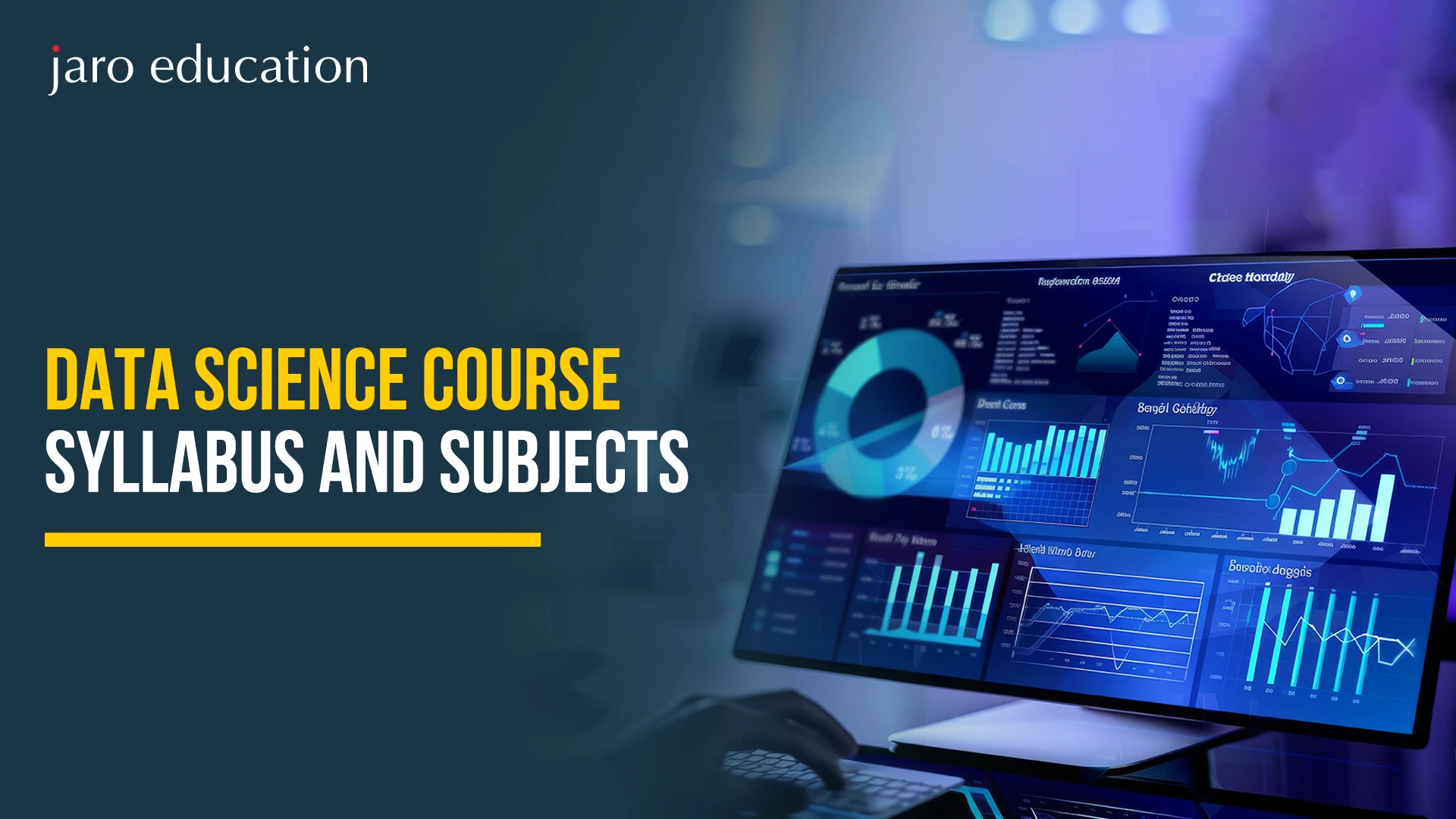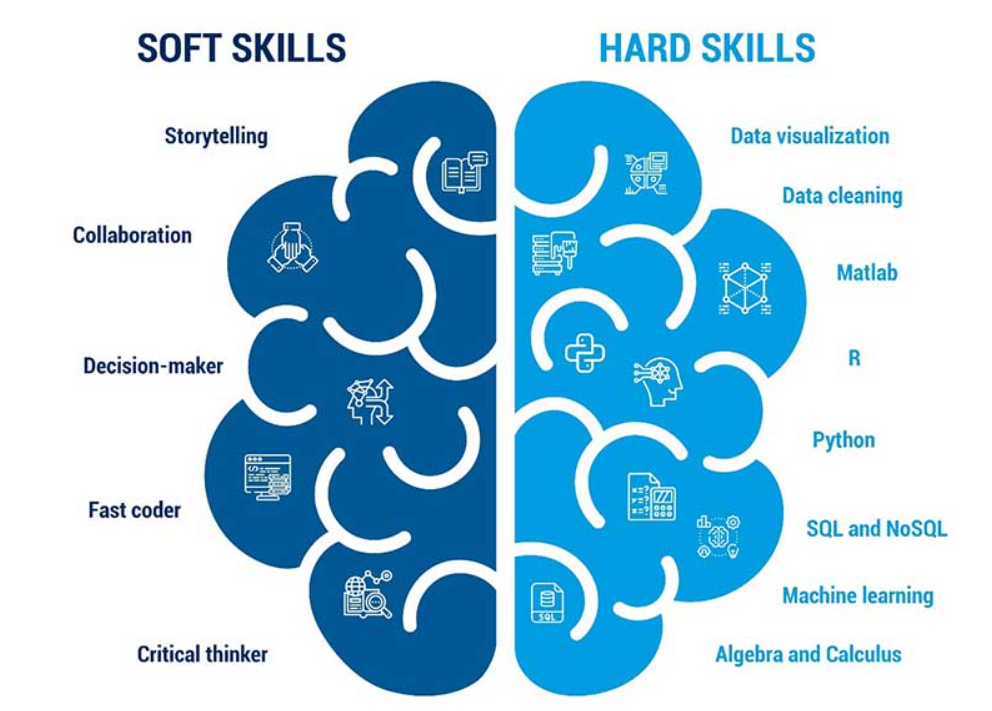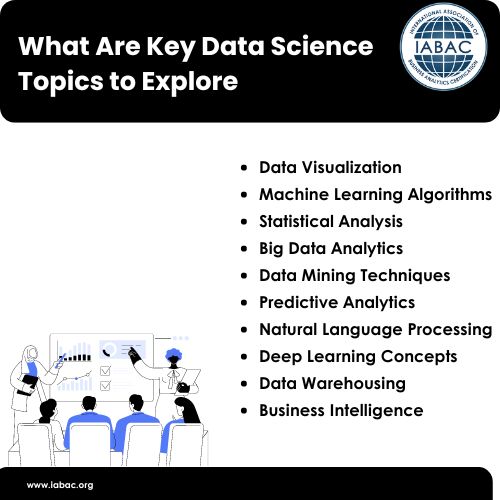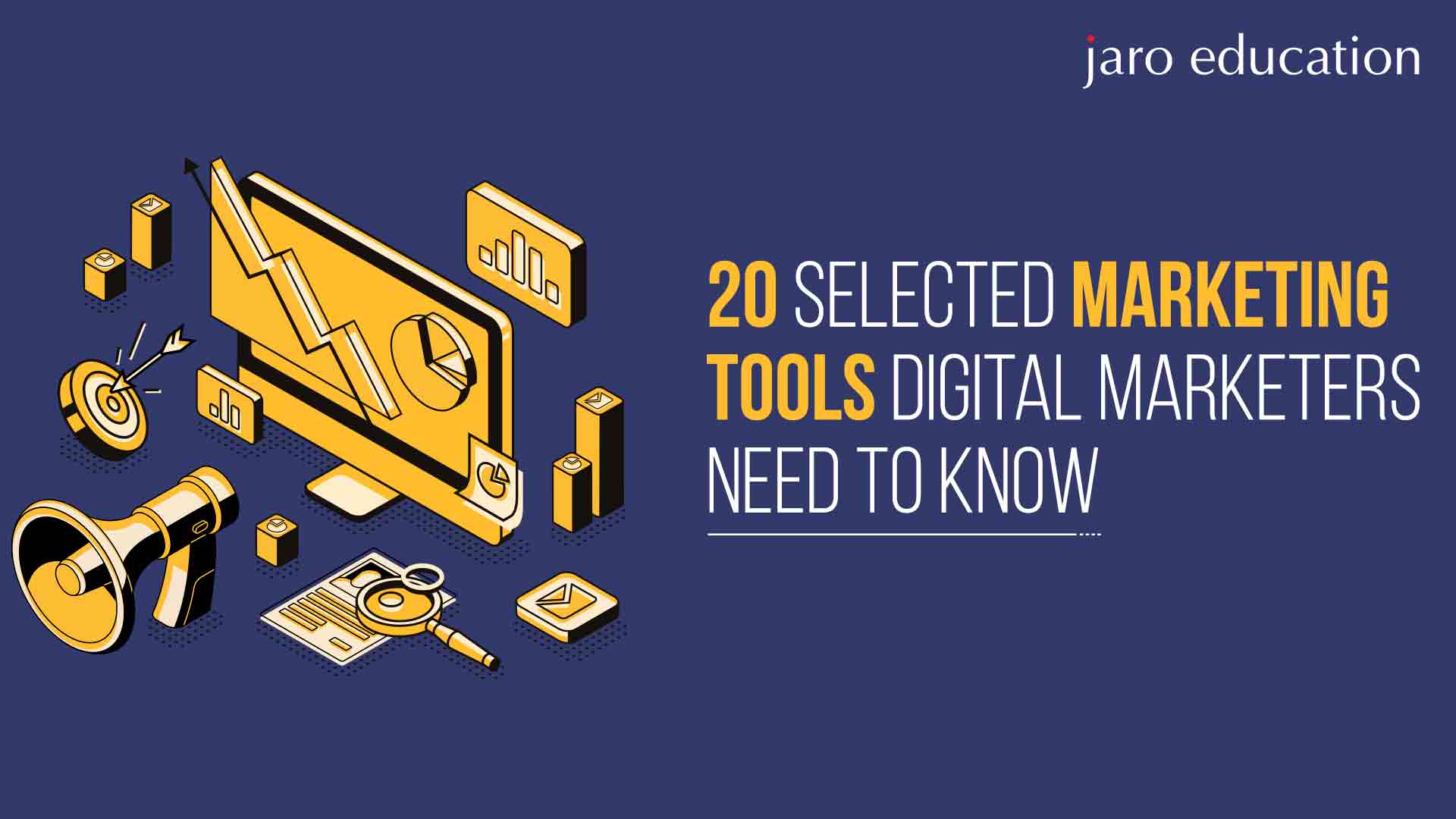Data Science Course Syllabus and Subjects
Table of Contents

Nowadays, in a data-driven digital landscape, data has become the new oil, helping shape decisions across sectors and industries. The expanding businesses’ interest in making the most of this data drives an equally sharp rise in the requirement for data scientists. If you’re thinking of embarking on training in this rewarding field, now couldn’t be a better time. It may seem daunting, but data science has a vast universe of topics and skills. The data science course syllabus would, however, help to break this down so you could have a milestone road for your learning journey. This blog shall expound the detailed syllabus for data science courses in the academic year of 2025. It shall showcase the core subjects, electives, and qualities an aspiring data scientist should master. So, let us know that and get thrilled with the world of training in data science!
Essential Skills for Data Scientists
Professionals navigate complex datasets and algorithms with the help of the right technical skills. Mastery of these essential proficiencies not only unlocks insights but also drives innovation in a data-driven world.

*appliedaicourse.com
Technical Skills
- Programming: Proficiency in programming languages such as Python and R is essential for data scientists. These languages are widely used for data analysis, machine learning, and statistical modeling, making them foundational skills in the field.
- Mathematics and Statistics: A solid understanding of mathematics, particularly in areas like probability, linear algebra, and calculus, is crucial. These concepts underpin many data science techniques and algorithms, enabling you to analyze and interpret data effectively.
- Data Wrangling: Skill in data wrangling is necessary for cleaning and transforming raw data into a usable format for analysis. This process involves handling missing values, filtering data, and reshaping datasets to ensure they are ready for exploration.
- Machine Learning: Familiarity with machine learning algorithms, both supervised and unsupervised, is critical. Understanding how to implement and evaluate these algorithms allows data scientists to build predictive models and draw insights from data.
- Data Visualization: Creating clear and informative visualizations is essential for communicating findings. Proficiency in visualization tools and libraries helps convey complex information in an accessible manner.
- Big Data Tools: As the volume of data increases, knowledge of big data technologies such as Hadoop, Spark, and NoSQL databases becomes increasingly important. These tools enable efficient data processing and management at scale.
Analytical and Problem-Solving Skills
- Critical Thinking: Data scientists must approach problems with a critical mindset, asking the right questions and identifying patterns. This process involves thinking creatively to devise effective solutions.
- Domain Knowledge: Understanding the specific industry you’re working in, whether it’s finance, healthcare, or marketing, is crucial. Domain knowledge helps frame problems accurately and ensures that your solutions are relevant and impactful.
- Attention to Detail: Precision is vital in data science. Minor errors in data handling or modeling can lead to incorrect conclusions, making meticulousness an important trait.
Now that you’re aware of the essential skills required for a data scientist, let’s delve deeper into the data science course in India syllabus
Core Subjects of the Data Science Course Syllabus
Programming Languages
Proficiency in programming is fundamental to mastering data science; it allows you to write effective code for data manipulation, model implementation, and workflow automation. Here are the key programming languages covered in the data science course syllabus:
- Python: Dominating the data science landscape, Python offers a rich ecosystem of libraries such as Pandas for data manipulation, NumPy for numerical computing, and Matplotlib for visualization.
- R: This language excels in statistical analysis and data visualization, making it a preferred choice for researchers and statisticians.
- SQL: Essential for querying structured data and managing relational databases, SQL enables data scientists to interact with databases efficiently.
- Java: Often used for building robust data applications, Java integrates well with big data technologies like Hadoop.
- Scala: Important for big data processing, Scala works seamlessly with frameworks like Apache Spark for distributed data processing.
- Python: Dominating the data science landscape, Python offers a rich ecosystem of libraries such as Pandas for data manipulation, NumPy for numerical computing, and Matplotlib for visualization.
Best Data Science Program Subjects
Now it’s time to take a look at some of the details of the best data science courses:
1. Statistics and Probability
Statistics forms the backbone of data science. This subject covers descriptive and inferential statistics, probability distributions, hypothesis testing, and statistical modeling. A solid grasp of these concepts enables data scientists to analyze data effectively, derive insights, and make informed predictions.
2. Programming
Programming is a crucial skill for data scientists. Courses typically cover programming fundamentals, data structures, algorithms, and software engineering principles, with an emphasis on Python and R.
3. Machine Learning
Machine learning is at the heart of data science. It teaches algorithms that enable computers to learn from data and make predictions. Key topics include supervised learning (regression and classification), unsupervised learning (clustering), and advanced techniques like deep learning and reinforcement learning.
Did you know? LinkedIn has over 450,000 job postings worldwide requiring machine learning expertise.
4. Data Mining and Data Wrangling
Data mining involves extracting valuable insights from large datasets. This subject focuses on data preprocessing, cleaning, exploration, and the use of algorithms to discover patterns. Data wrangling transforms raw data into a format suitable for analysis.
5. Databases and Big Data Technologies
Understanding databases is crucial in data science. This subject covers relational databases (SQL), NoSQL databases, and big data technologies like Hadoop and Spark. These tools facilitate efficient data storage, retrieval, and processing.
6. Data Visualization
Data visualization is the graphical representation of information, making complex data more accessible. Tools such as Tableau and Power BI, along with programming libraries like Matplotlib and ggplot2, are commonly taught.
7. Ethics and Data Privacy
With the power of data comes the responsibility to use it ethically. Programs address data privacy, protection, and biases in machine learning models, ensuring students understand the legal and ethical implications of their work.
8. Domain-Specific Applications
Many programs offer courses tailored to specific industries, such as healthcare or finance. These courses focus on applying data science techniques to solve industry-specific challenges, illustrating how data science can drive decision-making.
Data Science Topics in Detail
Let’s uncover the data science course syllabus in more detail:
Data Visualization
Data visualization involves representing data visually to communicate information clearly and efficiently. It employs tools like charts and graphs to help users understand trends and patterns in data, making it an indispensable skill for data scientists.
Machine Learning
Machine learning enables systems to learn from data and make autonomous decisions. It encompasses various algorithms for classification, regression, and clustering, making it a fundamental aspect of data science.
Deep Learning
Deep learning employs multi-layered neural networks to analyze complex datasets. This technology underpins many modern applications, including image and speech recognition and natural language processing.
Data Mining
Data mining extracts valuable information from large datasets. By combining machine learning, statistics, and database systems, it transforms data into actionable insights.
Programming Languages
Key programming languages in data science include Python and R. Python’s simplicity and extensive libraries make it a favorite, while R excels in statistical analysis.
Fun Fact: There are over 700 programming languages in existence today, each designed for specific tasks and applications.
Statistics
Statistics is essential for analyzing data and making predictions. This subject covers a wide range of techniques, including descriptive statistics, inferential statistics, and hypothesis testing.
Cloud Computing
Cloud computing offers scalable resources for storing and processing large datasets. Platforms like AWS and Google Cloud provide the infrastructure needed for deploying machine learning models and handling big data.
Exploratory Data Analysis (EDA)
EDA is the process of analyzing datasets to summarize their main characteristics. It often involves visual methods and is critical for uncovering patterns before formal modeling begins.
Artificial Intelligence
AI includes techniques that allow machines to mimic human intelligence. It encompasses machine learning, deep learning, and other algorithms that empower computers to solve complex problems.
Big Data
Big data refers to vast datasets that require advanced techniques for analysis. Its complexity and scale challenge traditional data processing tools, necessitating innovative solutions.
Data Structures
Data structures organize and store data effectively. Key structures include arrays, lists, and trees, which are crucial for optimizing algorithms used in data science.
Natural Language Processing (NLP)
NLP focuses on enabling computers to understand and generate human language. This field combines computer science, AI, and linguistics to facilitate human-computer interaction.
Business Intelligence
Business intelligence involves analyzing business data to provide actionable insights. It includes tools for data aggregation, analysis, and visualization to support decision-making.
Data Engineering
Data engineering emphasizes the practical aspects of data collection and pipeline architecture. It prepares large datasets for analytical or operational purposes.
Data Warehousing
Data warehousing is an electronic storage system designed for holding vast amounts of data. It facilitates query and analysis, serving as a unified database from various sources.
Database Management
Database management encompasses the processes involved in managing and retrieving data from databases, ensuring data integrity and security.
Linear Algebra
Linear algebra studies vector spaces and linear transformations. It forms a foundation for algorithms used in machine learning and data science.
Linear Regression
Linear regression analyzes relationships between variables to forecast outcomes. It serves as a fundamental technique in predictive analytics.
Spatial Sciences
Spatial sciences study phenomena related to geographic locations. They are essential for mapping and spatial analysis.
Statistical Inference
Statistical inference draws conclusions about populations based on samples. It includes estimating parameters and hypothesis testing.
Probability
Probability quantifies the likelihood of events occurring, forming a core aspect of statistical analysis and modeling uncertainties.

*iabac.org
Data Science Certification course and Career Paths
1. Data Scientist
Data scientists extract insights from data and build predictive models. They blend expertise in programming, statistics, and domain knowledge, often requiring skills in machine learning and big data tools.
Responsibilities:
- Data cleaning and analysis
- Building machine learning models
- Communicating insights to stakeholders
2. Data Engineer
Data engineers create and maintain the infrastructure that allows data scientists to work with clean, organized data. Their role includes designing data pipelines and managing databases.
Responsibilities:
- Data pipeline creation
- Database management
- Data warehousing
3. Data Analyst
Data analysts focus on understanding trends within data and communicate actionable insights. They create reports, dashboards, and visualizations to help businesses make data-driven decisions.
Responsibilities:
- Data analysis and reporting
- Creating dashboards
- Collaborating with business stakeholders
Best Data Science Certification
Data science certification courses validate expertise and provide a competitive edge in the job market. Notable data science online courses include the Post Graduate Certificate Programme in Data Science for Business Excellence and Innovation offered by IIM Nagpur.
This programme will show how one can apply modern AI and machine learning in practice. You will learn to combine people, data science tools, and innovative strategies to gain a competitive advantage.
Gain the knowledge needed to create effective analytical solutions, implement them effectively, and apply the results to reinforce your organization’s strategic and operational management. The programme is based on a dynamic blend of lectures, case studies, on-the-ground training, and other resources to facilitate practical learning and development.
Data Science Course Syllabus for Post Graduate Certificate Programme in Data Science for Business Excellence and Innovation - IIM Nagpur
If you are looking to delve deeper into data science techniques and tools, consider IIM Nagpur’s Post Graduate Certificate Programme in Data Science for Business Excellence and Innovation. This comprehensive one-year programme designed to equip students with a deep understanding of data science methodologies and tools. The curriculum emphasizes the application of modern Artificial Intelligence and Machine Learning techniques to solve complex business problems. Participants will gain expertise in data analysis, predictive modeling, and data visualization, enabling them to extract valuable insights and drive innovation within their organizations.
Programme Highlights
-
- PG Certificate & Alumni status from IIM Nagpur
- Exposure to real-time business problems and their solutions
- Gain exposure to new-age tools like AI/ML, Tableau, Python, and Google Analytics
- Personal mentoring and consultation from faculty
- Case study-based learning
- Chamber consulting sessions
- 3-day campus visit
How Jaro Education Helps
Jaro Education is a leading online higher education and upskilling company. We offer academic guidance and career counseling to learners who want to pursue their dream career. We are committed to transforming the online education landscape in India by providing more than 150 management, technology, and techno-functional programs in collaboration with top reputed institutes. If you’re enrolling for the Post Graduate Certificate Programme in Data Science for Business Excellence and Innovation offered by IIM Nagpur, you can take advantage of the Jaro Expedite-Career Booster benefit that includes:
- Profile Development
We focus on enhancing candidates’ profiles and resumes, including a thorough review of their LinkedIn presence. Jaro Education provides personalized feedback to strengthen your overall online visibility.
- Resume Evaluation
Our tailored resume review process ensures you are fully prepared for interviews in the evolving job market.
- Career Advancement Workshops
We connect top talent with leading organizations through insightful sessions featuring industry experts.
Conclusion
As we’ve explored, the field of data science is vast and multifaceted, offering numerous paths and opportunities for those willing to learn. The syllabus for the data science course in 2025 is designed to equip students with the essential skills and knowledge needed to thrive in this dynamic environment. From mastering programming languages to understanding machine learning algorithms, each component of the curriculum plays a critical role in shaping competent data scientists.
Embarking on a data science journey is not just about acquiring technical skills; it’s about developing a mindset that embraces curiosity, critical thinking, and ethical considerations. As you consider enrolling in a data science program, remember that this field is not just about numbers and algorithms; it’s about transforming data into actionable insights that can drive innovation and change.
Whether you’re an experienced professional seeking to change direction in your career or a recent graduate eager to establish yourself, the field of data science is ready to welcome you. Equip yourself with the right knowledge, practice diligently, and you’ll be well on your way to becoming a successful data scientist!
Frequently Asked Questions
If you want to excel in data science, we recommend you register for the Post Graduate Certificate Programme in Data Science for Business Excellence and Innovation at IIM Nagpur. This is one of the best data science courses in India with an industry-standard curriculum.
To enroll in a data science certification course, candidates typically need a bachelor’s degree in a relevant field such as mathematics, statistics, computer science, or engineering. Some programs may also accept professionals with significant industry experience in related domains.
The duration of data science courses can vary significantly. For example, the Post Graduate Certificate Programme in Data Science for Business Excellence and Innovation at IIM Nagpur lasts one year, while online courses may range from a few weeks to several months, depending on the curriculum.
The syllabus for the data science course covers a range of essential skills, including programming in Python and R, statistics and probability, machine learning, data visualization, database management, and ethical considerations in data handling.

















